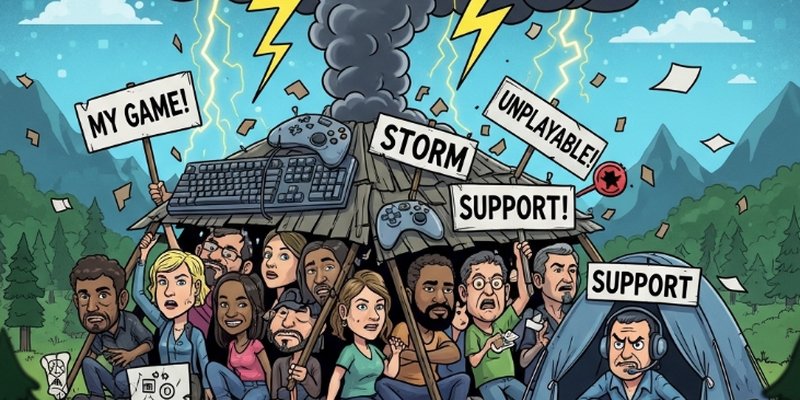The New Boss is the Bank: How Payment Processors Became Gaming’s Morality Police
If you’ve tried calling your credit card company lately, you might have been met with a question you didn’t expect. “Is this about the video games?” That’s the reality gamers are facing as they take their fight against a new wave of censorship not to the developers, but to the financial institutions pulling the strings. In a bizarre turn of events, it seems the ultimate arbiters of what you can play on platforms like Steam and Itch.io aren’t Valve or the indie devs, but the payment processors behind the scenes.
Let’s be clear: the recent delisting of adult and mature-themed games from major digital storefronts is not some spontaneous change of heart from Gabe Newell. This is a top-down mandate, a consequence of pressure from financial giants like Visa, Mastercard, and PayPal. These companies, spooked by so-called "morality defender" groups, have decided they’re now in the business of curating your game library. And gamers, in a rare moment of unified frustration, are starting to push back by flooding customer service lines and demanding answers.
The scale of this protest seems to be significant. One user on X and Reddit reported that upon calling Visa, the customer service rep, with a tone of utter resignation, preemptively asked if the call was about game stores and suggested sending an email instead. When your consumer complaints become a predictable script for call center employees, you know you’ve hit a nerve.
A Controversy Years in the Making
To understand how we got here, we have to look beyond gaming. This crusade for a sanitized internet has been waged for years against platforms like Patreon, OnlyFans, and Pornhub. The turning point, as expertly detailed by YouTuber Lextorias in his video breakdown of this “payment-driven” censorship, was a lawsuit against Pornhub’s parent company, MindGeek.
In that case, a judge made a precedent-shattering ruling. While the law-specifically, the FOSTA-SESTA Act-is supposed to protect intermediaries from liability for user-published content, the court decided Visa wasn’t just an impartial processor. By briefly suspending and then resuming business with MindGeek, Visa had, in the court's view, conducted an investigation and was therefore “aware” of the content on the site, making them potentially complicit. This ruling was made possible by the FOSTA-SESTA Act, a bill championed by the National Center on Sexual Exploitation, an anti-pornography lobby. The act has since been widely criticized as a failure in its stated goal of fighting human trafficking, but it’s been wildly successful in one area: giving activist groups a legal hammer to sue payment companies.
The hypocrisy here is staggering. As Lextorias points out, the same activists didn’t sue Facebook, which was linked to 20 million cases of child abuse imagery, compared to the 80 cases cited against OnlyFans. It was never about protecting people; it was about creating a weapon. This lawsuit gave Visa and its peers a bad-PR-and-legal-trouble allergy, and now they’re avoiding any “controversial” content like the plague.
This isn't even the first time we've seen this tactic. Lextorias also highlights a 2015 case where a sheriff, having lost in court, successfully used extra-judicial threats to coerce Visa and MasterCard into dropping the classifieds service Backpage. A court document from the defendant’s case put it best: "The judge inadvertently suggested a formula allowing for unauthorized, unregulated, unreliable, and unlawful government coercion."
Gamers Are Drawing a Line in the Sand
This brings us back to Steam. The argument used to nail Visa in the Pornhub case simply doesn’t apply to video games. No matter how perverse one might find a game’s content, its characters are made of pixels and polygons, not flesh and blood. There is no human exploitation. There is no trafficking. It’s fiction.
This is why publicizing this issue is so critical. When the gaming community collectively points its finger at the real source of the censorship, it massively undermines the power of these fringe “morality” groups. Their influence thrives in the shadows, relying on corporations’ fear of controversy.
And make no mistake, their ambitions won’t stop with a handful of niche adult titles. Collective Shout, the Australian group that instigated the pressure on Valve, has a history. They’ve previously tried to get games like Grand Theft Auto V and Detroit: Become Human banned. They’ve even targeted Snoop Dogg and Eminem concerts. Honestly, to think their crusade ends with removing the "filthiest" games is laughably naive.
The fate of these niche games might not concern the average player, but this is a classic slippery slope. If the community stays silent while financial institutions censor perfectly legal content, it sets a chilling precedent. Today, they’re coming for games you’ve never heard of. Tomorrow, they could be coming for the ones you love.





